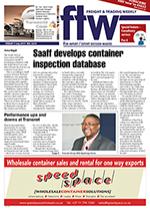For the road transport industry, business as usual is not an option. And competition will not come from traditional operators but rather from the 16-year-old tech-boffin who is thinking up the next Uber. That was the message from Gavin Kelly, technical and operations manager of the Road Freight Association, when he addressed delegates at a JCCI/FTW business seminar in Johannesburg recently. “We can’t carry on doing business as we are today. Whatever technology is developed, it needs to address efficiency of operation, the health of the drivers, the safety of the trucks, and safety equipment on those trucks because Ubers are out there ready to disrupt everybody.” Delays caused by traffic infringements ranging from vehicle overloading to the condition of the vehicle and the competence of the driver are major issues for the industry – and technology is facilitating far greater efficiency. Tracking the vehicle and its parts is already a given – and proof of delivery is also pretty much standard. “Many operators use geocaching and geotagging so that when they arrive at their destination the home depot is told the truck has arrived at the client, proving the load has been delivered without necessarily having the driver give you the information.” The biggest cost factor apart from wages is fuel, says Kelly. “We can’t get away from it, so if I can work out the best route in peak hours and avoid standing time, that cuts costs.” A major problem in the freight industry is the lack of experienced drivers who often work long hours – with fatigue regarded as the silent killer and diabetes widely prevalent. “We now have vehicles that can pick up if the driver is in a healthy state to drive.” Technology also has an answer to the issue of truck overloading which is often related less to the weight of the cargo than to the distribution of the load. When part loads are offloaded, the vehicle distribution is compromised. “New trailers have come out with floating decks as opposed to solid decks – so you can move the load around rather than having to unstrap the cargo which was the traditional method. With some of the latest vehicles, once the cargo, is offloaded you press a button and the panels start to move.” It’s all about dealing with problems before they happen, says Kelly. And while the many interventions are improving the efficiency of the trucking industry, they are also opening the way to disruptors which are pushing traditional boundaries.
Competition will come from the 16-year old techboffin who is thinking up the next Uber. – Gavin Kelly

